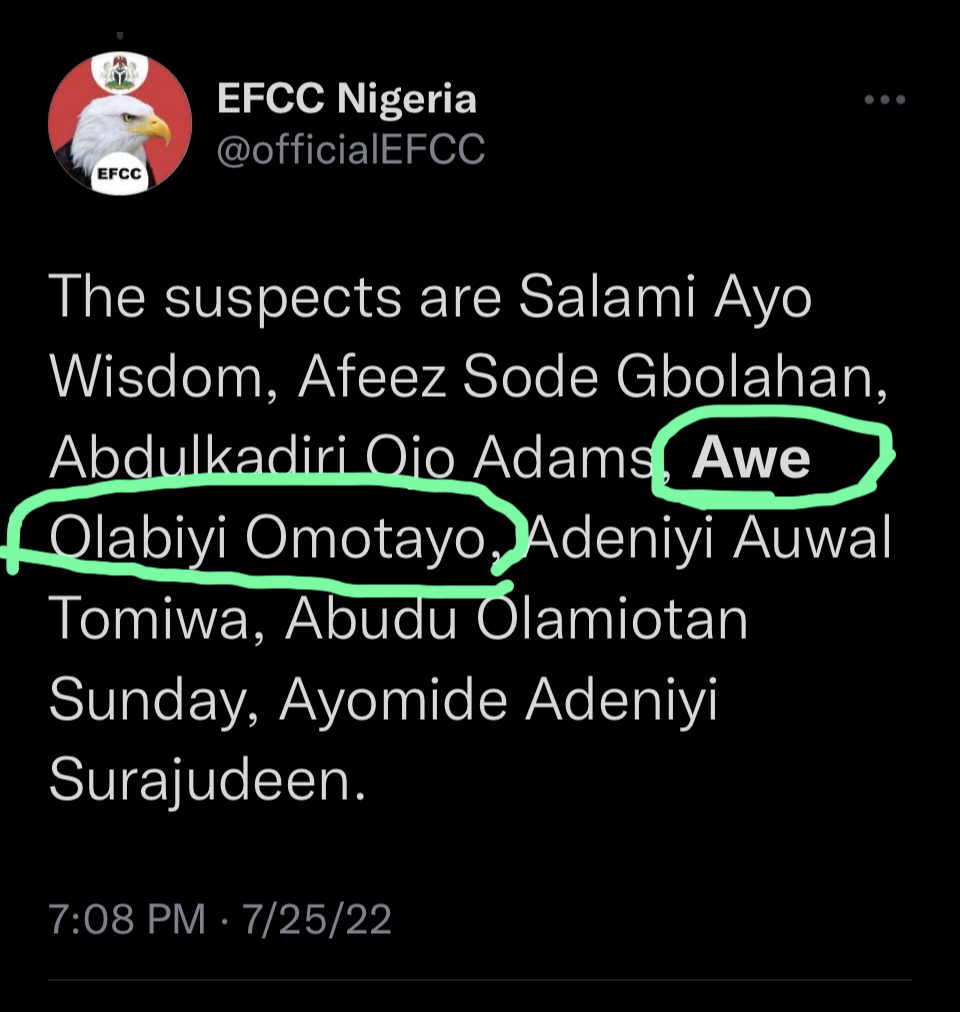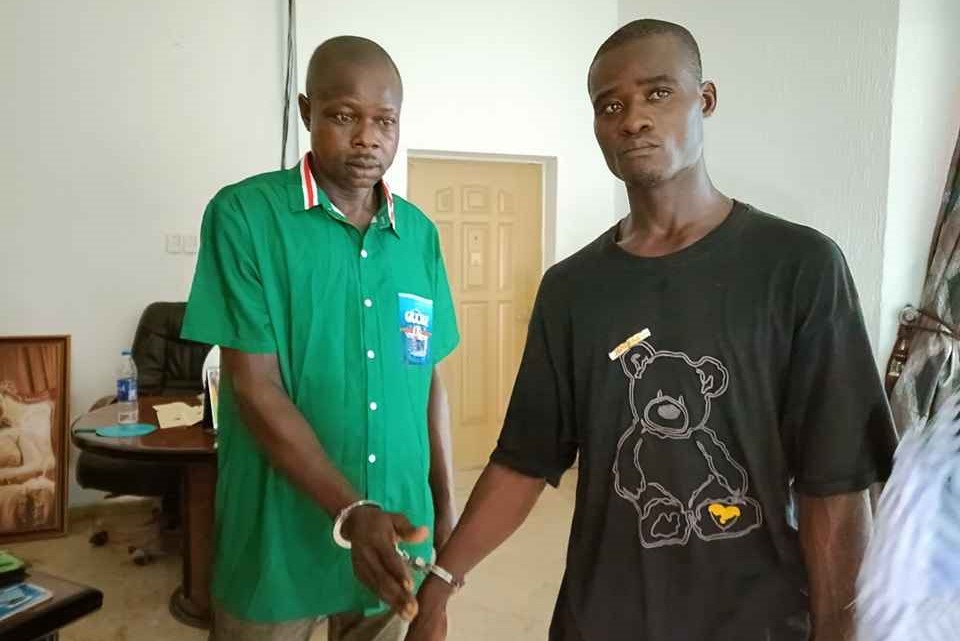They confiscated his phone, his wife’s phone, raided his home, detained him, listed him as a suspected fraudster on social media and obtained his Honda Accord.
By the time the ordeal came to an end on the evening of his arrest, only their phones were returned. Officials of the Economic and Financial Crime Commission (EFCC) frustrated him with wanton bureaucratic processes so much that he gave up his vehicle and relocated abroad with his family.
Olabiyi Awe does not think that he and his family would ever return to Nigeria.
“We do not wish to encounter such lawlessness from law enforcement agencies in Nigeria,” he told FIJ.
“I’m still not able to get over the harassment and embarrassment, followed by the blackmail by EFCC officers for seizing my car for an offence I never committed.”
It was around 6 am one Friday in June 2022. EFCC officials stormed into Awe’s Ibadan residence, fired a gunshot in the air and forced their way into his home and the three other apartments in his compound.
Hours later, while in custody, he and other young men apprehended in the EFCC raid would be forced to line up in front of their cars to be photographed. He would later learn that the photographs were uploaded on the commission’s social media pages and that his name was displayed as one of 34 suspected internet fraudsters apprehended by the EFCC.
But Awe is not a fraudster. He is a businessman who sells medical consumables. He’s also a husband and father to a lovely 4-year-old.
READ ALSO: EFCC Freezes Lagos Businessman’s 3 Bank Accounts for ‘a Crime He Knows Nothing About’
BREAKING AND ENTERING…
When Awe and his wife heard the shot fired in the air, they thought robbers had invaded their neighbourhood and that they would soon be robbed. They gathered all of their valuables: jewelries, phones, cash, and placed them on their living room table; laid flat and bared their faces to the floor as they waited on the impending robbery attack.
Soon, it was bang! bang!! bang!!! The door to their home was struck until it broke open. Awe recalls that there were five of the intruders – three men and two women. They identified themselves as officials of the EFCC.
Awe said on learning this, his wife challenged them. Why would they intrude their home in the manner that they had, and what crime had they committed that warranted such ambushing?
Their daughter, Amiyah (not real name), three then, was asleep, and Mrs. Awe was furious.
“My wife was not having it,” Awe told FIJ.
The officials wore muftis, save for two, who had the EFCC vest on. They said they had received a tip that a fraudster resided in Awe’s compound. They demanded both his and his wife’s phones, sifting through the contents as they searched the house.
Suddenly, one of the officials, a woman, raised the alarm, “na even yahoo boy.” In an instant, Awe was swooped by the officials and hauled outside his home into a white bus, where he joined about eight other young men, also suspected ‘yahoo boys’.
‘Yahoo boy’ is a Nigerian phrase for an internet fraudster.
READ ALSO: EFCC Names 7 Internet Fraud Suspects Arrested in Abuja
They had seen a photo of a Chinese lady while sifting through Awe’s WhatsApp content and concluded that he was a fraudster. Meanwhile, the lady was Alice, a staff at Soldier Brothers, a Chinese safety equipment manufacturing company that Awe is in business with.
“I kept asking the officials to read the content of the conversation between myself and the Chinese lady, but they refused,” Awe said.
HOW THE EFCC LOCKED DOWN AWE’S CAR
They moved him into their vehicle outside, but before hauling him into the bus, one of the officials turned to Awe, and asked, “Where is the car key?”
He turned back into Awe’s home and searched until he found the keys.
Awe said the EFCC official drove his car to the commission’s office while he and the others raided rode on the bus.
“When we arrived, they asked us to sit on the floor, and then they began to call us, one after another, to identify our phones. After we did, they assigned us to an official each,” he said.
Before they were allocated to different officials for interrogation, Awe said that they were asked to line up in front of their cars, and that photographs of them were then taken. He said this was against his will, and happened despite him protesting that he was not a fraudster.
“I received calls from business partners saying that they saw my name on EFFC’s Instagram page for internet fraud,” he said to FIJ.

After interrogating him, the personnel put in charge of Awe concluded the he was not a fraudster.

In recent years, internet fraud has increased among Nigeria’s young population. To curb it, the EFCC has depended on tips and sting operations to arrest those who they suspect to be fraudsters. The fallout from this, however, is the profiling, targeting, and victimization of young people by the EFCC, some of whom are legitimate workers.
“The other officials came into the room where I was being interrogated and asked the personnel interrogating me if I was a ‘yahoo boy’. He said no, and told them that I shouldn’t have been arrested.”
He was asked to arrange for two sureties. His wife and his brother-in-law stood in for him, and he was released that day at about 8 pm.
The officials handed his phone to him and asked him to return the following Monday to retrieve his car.
READ ALSO: Police Rearrest Chude Over Alleged Defamation
On Monday, he returned for his car and a new line of questioning presented itself. The officials had gained access to one of his bank accounts and queried him about the source of the money they found in it.
“It was N4.6 million. The money was paid into my account for the 33,000 litres of petrol I was to help my customer purchase at Folawiyo depot at Burma road Apapa,” he said, adding that he eventually returned the money when he couldn’t get the product for his customer.
After satisfactorily proving his claim to the officials, Awe said that he expected that he would have his car back, but that was not the case.
Soon, the officials asked for his car purchase documents, and to be taken to the vendor Awe bought the car from.
He met all of their conditions, and day after day, they told him, “Come back tomorrow.”
Frustrated with the situation, Awe employed the services of a lawyer. It was the lawyer who connected him to the zonal commander at the EFCC Ibadan command. Awe told FIJ that although the commander apologised for his experience with his men, he said he couldn’t do anything without a court order.
“He advised me to get a court order to retrieve my car,” said Awe.
“Why should I get a court order to retrieve my car when I wasn’t charged or found guilty of committing any crime?”
Awe never instituted a case against the EFCC because his lawyer told him that if he did, he would have to wait for the court judgement before he would be able to retrieve his car, and that the process might take some time.
He was also told he would need to be present if they instituted a case. But Awe did not have that time.
He had already begun the process to relocate abroad with his family and was not willing to be held back by a court case.
The EFCC dragged the release of Awe’s car until September, when he and his family finally left Nigeria.
Now settled abroad, Awe has made the decision not to return to Nigeria. He is yet to put behind him the illegal impoundment of his car and breaking into his home.
“That period was really difficult for me and my wife,” he told FIJ.
Although cleared of fraud allegations by the law enforcement agents themselves, Awe’s name is still listed as a suspected fraudster on their social media platforms.
Every day, the EFCC announces on its social media pages, the arrest of suspected internet fraudsters. They share photos and names of these people alongside photos of their confiscated gadgets as evidence of their commitment to ending fraud.
However, no further information is shared to the public about the suspects afterwards. Were they charged and prosecuted? Were there innocent people among those arrested, and have they been released? Have they been granted access to their confiscated properties?
FIJ spoke to Aaron, one of the EFCC officials who handled Awe’s case, and she declined to respond to any questions over the phone. She asked that we visit the commission in person for the answers we sought.
Subscribe
Be the first to receive special investigative reports and features in your inbox.















